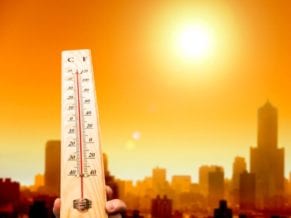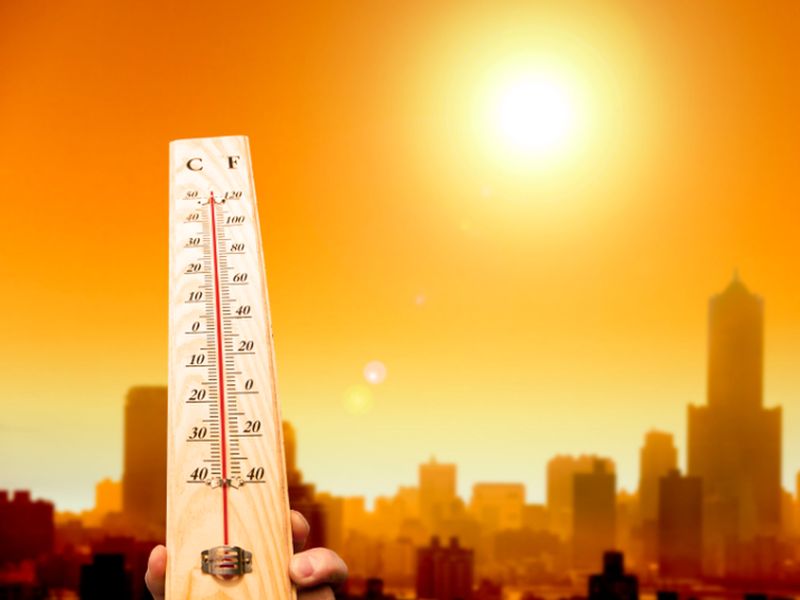IBCCES is the global leader in training and certification for healthcare professionals, educators and corporate partners who work with individuals with autism and other cognitive disorders. Our reach extends to more than 2 million people in all 50 states and over 70 countries around the globe. IBCCES Member Learning Community is provided as a free service to all IBCCES members who have completed one or more of our training and certification programs.
Climate Change's Hotter Days Will Take Toll on Mental Health
 This post was originally published on this site
This post was originally published on this siteLatest Mental Health News
 By Amy Norton
By Amy Norton
HealthDay Reporter
WEDNESDAY, March 25, 2020 (HealthDay News) — As the days heat up, people tend to report more emotional distress, a new study finds, adding to concerns that global warming could take a growing mental health toll.
The study of more than 3 million Americans found that the longer people had to sweat out 80-degree days, the bigger the mental health drain. They were more likely to report problems with depression, stress and emotional control — especially when the heat stretched to 10 days or more.
Anyone who has a short fuse during heat waves might be unsurprised. But researchers said the findings add to evidence that climate change could have a concerning impact on our collective mental well-being.
In particular, the study found, hotter days seemed to have a greater effect on people who were already struggling with poorer mental health.
“We show that people with poorer mental health are particularly affected by temperature. So they would also be particularly vulnerable under climate change,” said lead researcher Mengyao Li.
Li, who was a doctoral candidate at the University of Georgia in Athens at the time of the study, and her colleagues reported the findings in the March 25 issue of the journal PLOS ONE.
In recent years, studies have examined the mental health fallout of the “extreme weather events” that are expected to become more common with climate change — from prolonged droughts and wildfires, to hurricanes and floods. In the short term, those disasters typically fuel a spike in mental health conditions like depression, anxiety, post-traumatic stress disorder and substance abuse.
In 2017, the American Psychological Association (APA) published a report on the issue. At that time, studies indicated that anywhere from 7% to 40% of natural disaster survivors develop some sort of mental health pathology.
Susan Clayton, a professor of psychology at the College of Wooster in Ohio, was an author of the APA report.
As it stands, she said, there is far more research on the physical health effects of climate change and its manifestations, like heat waves. But there is growing interest in the mental health consequences, Clayton said.
Why would hot days take a toll? Research suggests that heat exposure can increase aggressive behavior in some people, Clayton said. Plus, she added, it may affect moods more indirectly — through poorer sleep, for example, or by keeping people indoors.
“People may be less likely to go outside, and time outdoors is good for your mental well-being,” Clayton said. “And they may get less exercise, which also benefits your mental health.”
For the study, Li’s team used data from an ongoing government health survey, for the years 1993 to 2010. It gauged people’s mental well-being with this question: “Thinking about your mental health, which includes stress, depression and problems with emotions, for how many days during the past 30 days was your mental health not good?”
Researchers correlated those responses with daily temperature data for U.S. counties.
Compared with a “comfortable” temperature range of 60 to 70 degrees Fahrenheit, people’s ratings of their mental health declined as the days heated up — particularly beyond 80 degrees and when the heat lasted for 10 days or more, the study found.
On average, for each additional day above 80 degrees, the likelihood of reporting a bad mental health day in the past month rose by 0.3%. In contrast, those odds dipped when temperatures dropped below 20 degrees.
Of course, individuals vary in whether they are vulnerable to heat stress, Li said. And the researchers found that people who reported “frequent” mental distress were more likely to report heat-related problems.
It’s also likely that income and resources — like access to air-conditioning — matter, according to Li.
“That’s something we believe deserves more investigation,” she said.
Clayton said that while broad efforts are needed to address climate change, it’s also important to recognize that individuals can be “resilient.”
“This doesn’t mean we’re all doomed to have poor mental health,” she said. “It’s a reminder that we need to be prepared.”
That might mean, for instance, communities ensuring air-conditioned public spaces for people who need them, which can lessen the physical health threats from heat waves, Clayton said, adding that the mental health benefits are unknown.
She also recommended checking up on others during heat waves, especially the elderly or other vulnerable people.
“Social connections are a good source of resilience,” Clayton said.

Copyright © 2020 HealthDay. All rights reserved.
SLIDESHOW
Learn to Spot Depression: Symptoms, Warning Signs, Medication See Slideshow
References
SOURCES: Mengyao Li, Ph.D., department of agricultural and applied economics, University of Georgia, Athens; Susan Clayton, Ph.D., M.S., professor and chairwoman, department of psychology, College of Wooster, Wooster, Ohio; March 25, 2020, PLOS ONE, online
